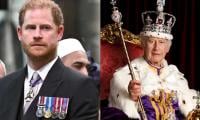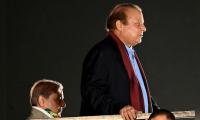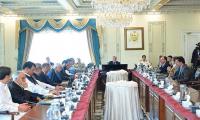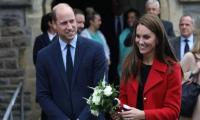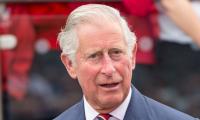LAHORE
Speakers at a seminar on “New American Administration and Pakistan’s Strategy” emphasised that Pakistan need not fear a change of leadership in the US and there are many opportunities for cooperation to fight terrorism and bring peace to Afghanistan.
The seminar was arranged by Pakistan Institute of National Affairs (PINA) and addressed by Ahsan Iqbal, Minister for Planning and Reforms and former Law Minister SM Zafar, Prof Farooq Hasnat, Prof Shabbir Ahmad Khan, former ambassador Javaid Hussain, Altaf Hasan Qureshee, Secretary General PINA, and Muhammad Mehdi.
“Over 10,000 Pakistani youth will be sent to American universities for higher education,” said Ahsan Iqbal at the seminar. He made a comprehensive analysis of Pak-US relationship in the background of the outcome of the recent US presidential election. Referring to US President Trump’s unconventional victory, he said that Pak-US relationship had survived three ‘divorce’ situations. He said there was a sea of change between the 20th century and the 21st century, and in parallel Pakistan too was undergoing a paradigm shift from geopolitical to geo-economics importance. “We should not waste time in ideological discussion and grasp ground realities of the current century which can guarantee success on acting upon three formulae: First, to accelerate the growth of wealth; Second, to affect equitable distribution of wealth without ignoring regions or classes and third; to complete for productivity.”
Ahsan said that foreign policy depends on internal stability and recalled that in 2013 Pakistan was declared by the Western media as a place more dangerous than Iraq. “But now all media and international surveys are indicating that Pakistan is the second fastest emerging economy after China in the world.”
He enumerated that Pakistan’s reserve had grown from $8 billion to $23/24 billion and the deficit index fell from 9pc to 5pc. “As for as Pakistan’s foreign policy is concerned, Europe, UK, Iran, Middle East and even Russian have shown their interest in joining the CPEC. Pakistan is building the US-Pak Knowledge Corridor under which 10,000 young talented Pakistanis would be sent to America for PhD. Trump’s priorities are the fight against terrorism and bring peace to Afghanistan. Pakistan can contribute to the realms. Prime Minister Nawaz Sharif had a sanguine telephonic talk with Mr. Trump who at an ambassadors’ gathering told the Pakistani envoy in US that he had a talk with the prime minister and looked forward productive relations between the two countries. He proclaimed that Pakistan is now rising and that the people have given their verdict in favour of Nawaz Sharif at every forum whether local government or by-elections during these years,” he adde.
Altaf Hasan Qureshee recalled that it was the US that had attended our first anniversary of independence with great enthusiasm.
“The US gave unparallel reception to Pakistan’s first Prime Minister’s visit to the country.”
Veteran jurist SM Zafar said that foreign policy of a country depends on its interest. “If the interests of two countries converge, the foreign policy between the two takes positive shape. With the new president in the US, we should see how far the interests of our own country fall in line with the US and wait for the process of history to take its course and affect changes if any in the relations. We should not accelerate the pace of differences unnecessarily between the two countries,” he observed.
Prof. Shabbir Ahmad said that three episodes had drastically impacted Pak-US relations viz 9/11, Sahalla Post, Abbottabad. Muhammad Mehdi said he considered the issues of differences between the US and Pakistan were of petty nature and could be resolved. Qayyum Nizami suggested that to strengthen foreign policy, we should have a permanent foreign minister.
Sabahat Rafiq from Silicon Valley USA gave a review of the upset results of the US presidential election and suggested that Pakistan should focus on US Congress, think tanks and universities for developing relations with the US.
Hussain Ahmad Shirazi said Huntington had theorised the 21st century would witness a conflict of Islamic and Christian civilisations. “Iraq and Afghanistan have faced destruction and now Syria is the target of annihilation.” Prof Farooq Hasnat said America needed Pakistan in the cold war era, but now with the arrival of Trump, the situation had changed. Former Ambassador Javed Hussain said that Trump had focused on terrorism for which the US wants Pakistan’s cooperation. “Pakistan in the zone has a declared policy and some ambiguities, which need to be addressed. Peace in Afghanistan is the second concern of the US for which Pakistan is a stakeholder.”
Political analyst Muhammad Mehdi said that Pak-US relations could develop on mutual understanding and cooperation. “There are good chances to work together for global peace especially in South Asia.
Oman-based investor Javed Nawaz said that Trump had given a clarion call to sleeping Muslims. He alluded to the moral dichotomy in us that we belittle the US on one hand and on the other go for McDonald’s burgers. He advised, “We should strengthen the country by strengthening ourselves and shunning the attitude of hatred.”
Asma Jahangir Conference. — Twitter/FileLAHORE:The Asma Jahangir Legal Aid Cell will be hosting the Asma Jahangir...
This representational image shows Solar panels. — Unsplash/FileLAHORE: Chinese Consul-General Zhao Shirin Thursday...
Participants attend the informative “PhD Scholars workshop arranged by the University of Veterinary & Animal...
Lahore College for Women University Vice Chancellor Prof Dr Shagufta Naz seen in this image. — LAHORE COLLEGE FOR...
Provincial Minister of Specialized Healthcare and Medical Education Khawaja Salman Rafique addresses an event on March...
Punjab Assembly Speaker Muhammad Ahmad Khan addresses media persons in this still on April 25, 2024. —...


